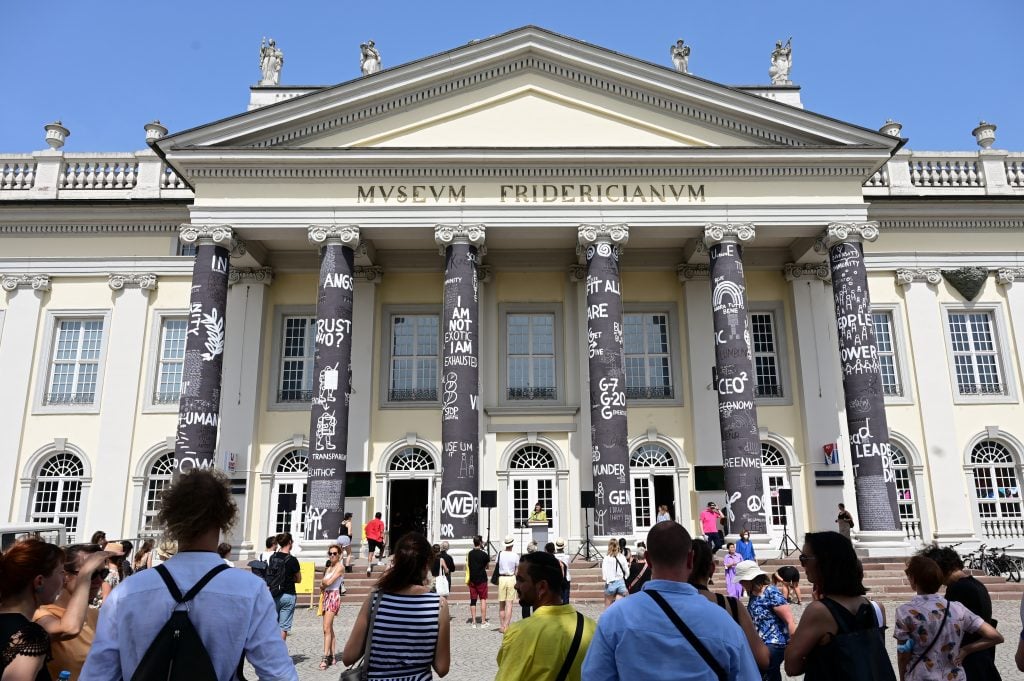Art World
After Much Upheaval, Documenta Hits Reset With a New Finding Committee
The appointments follow mass resignations over antisemitism allegations last year.

The appointments follow mass resignations over antisemitism allegations last year.

Margaret Carrigan

The Documenta supervisory board has appointed a finding committee for Documenta 16 in Kassel, Germany. The event will go ahead in 2027, but without a code of conduct for its artistic director following antisemitism controversy that led to mass resignations last year.
The committee, announced today, includes: Yilmaz Dziewior, the director of Museum Ludwig in Cologne; Sergio Edelsztein, a freelance curator and founder of the Center for Contemporary Art in Tel Aviv; N‘Goné Fall, a curator, cultural policy specialist, and former general commissioner of France’s Africa2020 Season, appointed by Emmanuel Macron; Gridthiya Gaweewong, artistic director of the Jim Thompson Art Center in Bangkok and the co-director of the 2023 Thailand Biennale; Mami Kataoka, the director of the Mori Art Museum in Tokyo; and Yasmil Raymond, an independent curator and the former director at Portikus and Rector of Städelschule, and a trustee of the Teiger Foundation, Dia Art Foundation, the Stephen Antonakos Foundation, and A.R.T. (Art Resources Transfer), all based in New York.
The group will begin its search for an artistic director immediately by inviting leading figures in contemporary art to submit their concepts for the next edition.
“I am certain that the expert and multi-perspective make-up of the new Finding Committee will lead to a forward-looking proposal for the Artistic Direction,” Andreas Hoffmann, the managing director of Documenta and Museum Fridericianum, said in a statement. “This lays the foundation for the international art world to once again be a familiar and welcome guest in Kassel.”

From left to right: Yilmaz Dziewior (Photo: Falko Alexander), Gridthiya Gaweewong (Photo: Angkrit Ajchariyasophon), N’Goné Fall (Photo: F. Diouf), Mami Kataoka (Photo: Ito Akinori), and Sergio Edelsztein (Photo: Albi Serfaty).
Last November, the prestigious quinquennial contemporary art event was thrown into chaos when the previous selection committee collectively resigned after the departure of committee member Ranjit Hoskoté. Following the October 7 Hamas attack in Israel, and Israel’s ensuing war on Gaza, the writer had come under fire for alleged antisemitism from German media and government for signing a 2019 statement protesting “Hindutva and Zionism.”
In a letter to to Hoffmann, who had taken up the managing director post a few months prior, Hoskoté described the accusations of antisemitism against him as “monstrous” and said he felt pressured “to accept a sweeping and untenable definition of antisemitism that doesn’t differentiate between the Jewish people and the Israeli state… and misrepresents any expression of sympathy with the Palestinian people as support for Hamas.”
Following his departure, Bracha Lichtenberg Ettinger also resigned after Documenta refused to delay the next exhibition. The remaining four panel members—Simon Njami, Gong Yan, Kathrin Rhomberg, and María Inés Rodríguez—wrote in a resignation letter to Documenta management that they “do not believe that there is a space in Germany for an open exchange of ideas and the development of complex and nuanced artistic approaches that Documenta artists and curators deserve” and that they felt “grave concern” for the future of the exhibition.
Documenta 15, held in 2022, had also been marred by claims of antisemitism. Curated by the Indonesian artists’ collective ruangrupa, the organizers removed several works that were deemed to contain antisemitic imagery. The then-managing director of the show was forced to resign and a member of ruangrupa was asked to explain their reasonings for including the works to German parliament. The exhibition concluded with an open letter from the curators and artists involved saying “we are angry, we are sad, we are tired” of what they described as “the chaos, hostility, racism, and censorship that have engulfed this edition of Documenta.”
In May, the Documenta supervisory board announced that it would proceed with its 2027 edition, but without installing a code of conduct for its artistic director. This was among several recommendations laid out by Documenta’s appointed expert advisory panel, which was installed after the previous edition’s controversy. Documenta said the exhibition and the Fridericianum museum will adopt their own codes of conduct, but that the artistic director would be under no such obligation. The artistic director would, however, be required to give a public talk explaining their curatorial theme and confirm “their understanding of respect for human dignity.”